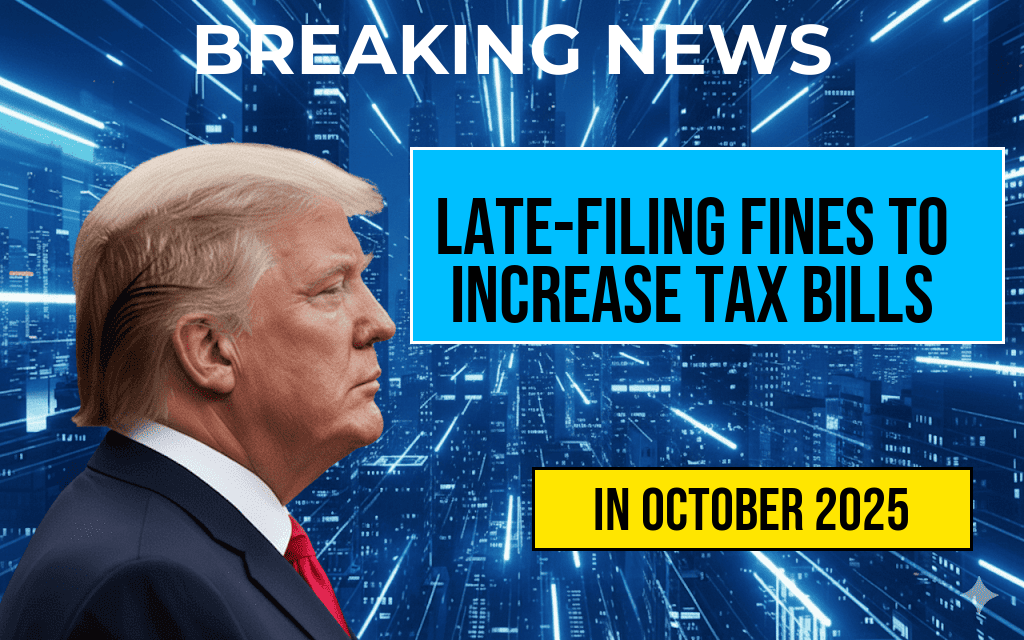The Internal Revenue Service (IRS) is set to implement new penalties for late tax filings in 2026, resulting in potential increases to taxpayers’ bills by hundreds of dollars. As the federal government seeks to enhance tax compliance and efficiency, these rising penalties may have significant financial implications for individuals and businesses alike. The adjustments aim to address historical discrepancies in penalty structures and encourage timely submissions during tax season. Taxpayers are urged to familiarize themselves with these upcoming changes to better prepare for their financial obligations and avoid unexpected fees.
Understanding the New Penalty Structure
The IRS has been revising its penalty framework to better align with inflation and the increasing complexity of tax compliance. As of 2026, late-filing penalties will rise, with the potential for fines to escalate dramatically, especially for those who consistently file their taxes past the deadline. The current penalty for failing to file on time is typically 5% of the unpaid tax amount per month, capped at 25%. However, these rates are expected to increase, significantly impacting taxpayers.
Projected Penalty Increases
The IRS plans to adjust penalties based on several factors, including the number of previous violations and the size of the tax liability. Below is a breakdown of the anticipated penalty structure:
| Tax Liability | Current Monthly Penalty (5%) | Projected Monthly Penalty (2026) | Maximum Penalty (Current) | Maximum Penalty (2026) |
|---|---|---|---|---|
| $1,000 | $50 | $75 | $250 | $375 |
| $5,000 | $250 | $375 | $1,250 | $1,875 |
| $10,000 | $500 | $750 | $2,500 | $3,750 |
Who Will Be Affected?
The new penalties will affect a wide range of taxpayers, including:
- Individuals: Those who file personal income tax returns late may face heavier fines.
- Small Businesses: Enterprises that fail to file their business taxes on time could see significant increases in their tax liabilities.
- Self-Employed Individuals: Freelancers and independent contractors must be particularly vigilant due to their unique tax situations.
Preparing for the Changes
With these changes on the horizon, taxpayers are encouraged to take proactive measures to mitigate their risk of incurring penalties. Here are some tips to consider:
- Stay Informed: Regularly check IRS announcements and updates regarding tax regulations.
- File Early: Filing returns well before the deadline can help avoid potential penalties.
- Consult a Professional: Engaging with tax professionals can provide tailored advice and strategies for compliance.
The Importance of Timely Filing
Meeting tax deadlines is crucial not just to avoid financial penalties, but also to maintain a good standing with the IRS. Delayed filings can lead to complications in future tax dealings and may trigger audits. Understanding the implications of the new penalty structure will be vital for effective financial planning.
Conclusion
The IRS’s impending adjustments to late-filing penalties in 2026 underline the importance of timely tax compliance. As taxpayers prepare for these changes, awareness and proactive management of tax obligations will be essential in navigating the evolving landscape of tax law. For more detailed information on tax penalties and compliance, visit the IRS website or consult trusted financial resources on platforms such as Forbes.
Frequently Asked Questions
What are the new late-filing fines expected in 2026?
The late-filing fines in 2026 are projected to increase significantly, potentially adding hundreds of dollars to your overall tax bill. Specific amounts will depend on various factors, including your filing status and the duration of the delay.
How can late-filing penalties affect my tax return?
Late-filing penalties can substantially increase your tax return liability, leading to a much larger bill than anticipated. It’s crucial to file on time to avoid these additional costs.
Are there any exceptions to the late-filing penalties?
While there can be some exceptions, such as severe hardship or natural disasters, generally, the late-filing penalties will apply uniformly to those who miss the deadline. It’s advisable to check with a tax professional for specific circumstances.
What should I do if I can’t file my taxes on time?
If you’re unable to file your taxes on time, you should consider applying for an extension. However, keep in mind that an extension only postpones your filing deadline and does not eliminate any potential late-filing fines.
How can I avoid late-filing penalties in the future?
To avoid late-filing penalties, ensure that you file your taxes by the deadline each year. You can also use tax software or consult with a tax professional to keep track of important dates and requirements.













